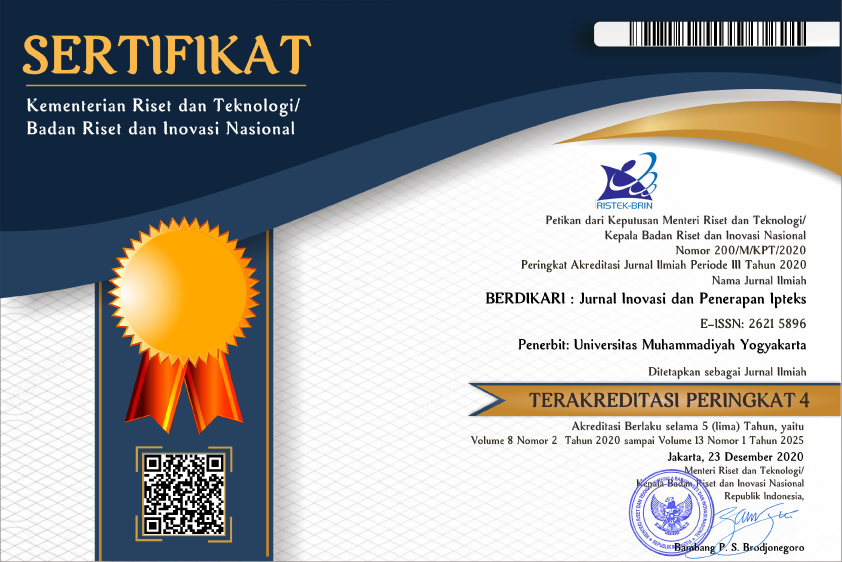Peningkatan Pendapatan Keluarga Melalui Produksi Kecap Limbah Tahu
DOI:
https://doi.org/10.18196/bdr.6242Abstract
Tofu is made of soybean. Tofu is one of the protein sources needed by our body. During the process of making tofu is produced waste materials (waste) both with a solid texture or liquid. Solid texture waste is usually sell very cheap for livestock feed, whereas liquid waste is thrown away with other domestic wastes every day. The liquid waste volume was increasing daily. People was produce tofu everyday so it is definitely waste formed daily that is dis-charged to the environment. It is feared can further pollute the environment. The purpose of this community service is to utilize the tofu waste as the raw material for soy sauce in an effort to overcome environmental pollution by tofu industry waste and increase the family income. The methods used in this community service were counseling, training and skills practices of targeted community groups on the mastery of processed waste technologies in the form of soy sauce. Also to facilitate some tools to support tofu production process. The result of community service shows that the target community has been able to master the processing of tofu waste into soy sauce from the beginning of processing until the production, soy sauce produced has been marketed and generated a profit of 4.5%. And the profit that can be obtained in soy sauce production is 4.5%. Key words : Tofu waste, Soy sauce, Environment pollution, income
References
Anna Poedjiadi. (1994). Dasar-dasar Biokimia.
Jakarta : UI-Press.
Djoko Wibowo, Sandjono, Bambang Haryono, Djoko Wijono. (1987). Prinsip-prinsip Teknologi Fermentasi. Yogyakarta : Pusat Antar Universitas Pangan dan Gizi UGM.
Endang S.Rahayu. (1993). Bahan Pangan Hasil Fermentasi. Yogyakarta : Pusat Antar Universitas Pangan dan Gizi UGM.
Hans G. Schlegel dan Karin Schmidt. (1994). Mikrobiologi Umum. Yogyakarta : Gadjah Mada University Press.
Kapti Rahayu Kuswanto dan Sudarmadji S. (1987). Proses-proses Mikrobiologi Pangan. Yogyakarta : Pusat Antar Universitas Pangan dan Gizi UGM.
Slamet Sudarmadji, dkk. (1989). Mikrobiologi Pangan. Yogyakarta : PAU Pangan dan Gizi UGM.
Sudarmadji S., Bharyono, dan Suharti. (1997). Prosedur Analisa untuk Bahan Makanan dan Pertanian. Yogyakarta : Liberty.
Tien R. Muchtadi. (1997). Nata De Pina. Media Komunikasi dan Informasi Pangan Nomer 33 Volume IX –1997.
Sudarmadji S., HAryono B, Suhardi, 1997. Prosedur analisa untuk bahan makanan dan pertanian , Liberty Yogyakarta
Widarto. (2001). Teknologi Tepat Guna. Disampaikan pada pembekalan mahasiswa peserta KKN Universitas Negeri Yogyakarta.
Downloads
Published
Issue
Section
License
Copyright
Authors retain copyright and grant BERDIKARI Jurnal Inovasi dan Penerapan IPTEK the right of first publication with the work simultaneously licensed under an Attribution 4.0 International (CC BY 4.0) that allows others to remix, adapt and build upon the work with an acknowledgment of the work's authorship and of the initial publication in BERDIKARI Jurnal Inovasi dan Penerapan IPTEK.
Authors are permitted to copy and redistribute the journal's published version of the work (e.g., post it to an institutional repository or publish it in a book), with an acknowledgment of its initial publication in BERDIKARI Jurnal Inovasi dan Penerapan IPTEK
License
Articles published in the BERDIKARI Jurnal Inovasi dan Penerapan IPTEK) are licensed under an Attribution 4.0 International (CC BY 4.0) license. You are free to:
- Share — copy and redistribute the material in any medium or format.
- Adapt — remix, transform, and build upon the material for any purpose, even commercially.
This license is acceptable for Free Cultural Works. The licensor cannot revoke these freedoms as long as you follow the license terms. Under the following terms:
- Attribution — You must give appropriate credit, provide a link to the license, and indicate if changes were made. You may do so in any reasonable manner, but not in any way that suggests the licensor endorses you or your use.
- No additional restrictions — You may not apply legal terms or technological measures that legally restrict others from doing anything the license permits.




